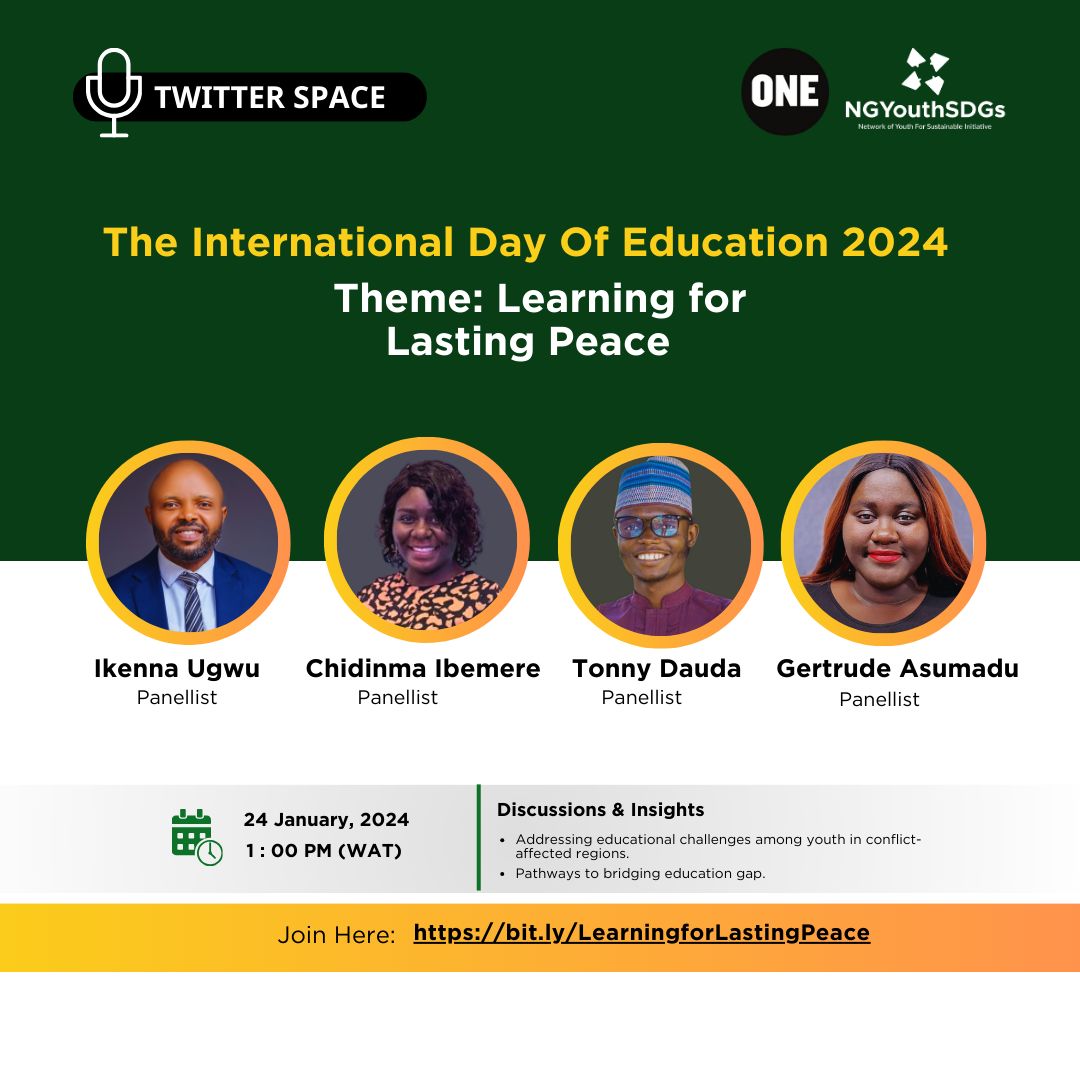Learning for Lasting Peace: A focus on improving access to education in conflict-affected regions.
Last week, I was invited by Nigeria Youth SDGs Network to speak at her X Space program in commemoration of the International Day of Education, 2024. Perhaps inspired by this year’s International Day of Education theme, “Learning for Lasting Peace,” the topic of the program was “earning for Lasting Peace: A focus on improving access to education in conflict-affected regions. Both the IDE’s theme and the program topic resonates deeply with my passion for education and its transformative power to shape a more peaceful and equitable world.
World Bank data shows that a total of 324 million extremely poor people reside in 33 countries classified as fragile and conflict affected areas. This growing trend of conflict and violence has a significant impact on young people accessing education, and Nigeria is not isolated from this problem. For over 12 years, certain parts of the northeast and other geopolitical zones have experienced banditry and terrorist attacks, making it difficult, and many times, impossible for children and young people to access education.
The International Day of Education, observed on January 24, is a global celebration of the importance of education in building a better future. The X Space program is a remarkable initiative by the Nigeria Youth SDGs Network that brought together changemakers, thought leaders, and innovators to share insights and ideas on the challenges, possibilities and opportunities in harnessing education for sustainable peace.
It was a huge opportunity for me as I shared my perspectives on how education can be a powerful tool for fostering lasting peace.
Below are key takeaways from the conversation
1. Review of Educational Curriculum: To ensure lasting peace in Nigeria and globally, academic curriculums need to be reviewed to prioritize the learning of peace education. While it is essential to teach the history of a nation, schools should also teach about current events that cause instability and dismiss peace within a country. This will encourage a solution-oriented mindset in young people.
2. Education and Poverty: Almost 700 million people worldwide live in extreme poverty, where unemployment and a lack of fair and inclusive education contribute to the cycle of poverty. We cannot rely solely on charity to fight poverty but must tackle poverty as an injustice. By doing so, we can end the circle of young people who are educated but unemployed, uneducated and unskilled, or educated but lacking the necessary skills for the workforce.
3. Amending Educational Policies: Policies should be established based on the specific needs of a nation. Even if a policy works well in one country, it may not yield the same results in another country. Nigeria needs to look inward to understand the particularities of its educational system and develop actionable policies.
4. Education Financing: The government can increase funding for education through a diversified funding source. This includes establishing public-private partnerships, engaging donors and philanthropists, and debt negotiation with organizations like the IMF and World Bank. For instance. when loans are paid back on time, a certain percentage can be given as a chargeback, which could be reinvested into the education system.
5. Strengthening Other Education Focal Points: In addition to building quality schools, training teachers and enumerations should be a priority. Extracurricular activities of students in both tertiary institutions and elementary schools should also be factored in. All of this would lead to a wholesome approach to fostering quality education for all.
6. Exploring Informal Educational Methods: In conflict-affected regions, vocational training and apprenticeships can provide essential skills for young people. This can serve as a channel of bridging unemployment and provide an informal learning system for young people. Coupled with the introduction of green skills, vocational training is a viable pathway for young people in conflict zones to become economically empowered and engage in productive activities, leading them on the path of becoming employers of labour.
7. Community-based Strategy: Strategies such as community learning centres, maximizing communication platforms such as radio stations, and collaboration between local government leaders and NGOs can improve access to education in communities affected by violence.
Other important areas that I spoke about relates to:
- The intersection of education and peacebuilding
- The role of inclusive and equitable education in promoting social cohesion
- Innovative approaches to education for sustainable peace
It was a great honor to join esteemed lineup of speakers and to contribute to a conversation that has the potential to inspire meaningful change.
Why Education Matters
Education is the foundation upon which we build our collective future. It has the power to break cycles of violence, discrimination, and inequality, and to cultivate empathy, understanding, and peaceful coexistence. If we prioritize education, we will empower individuals, communities, and nations to thrive and contribute to a more peaceful world.
Addressing the education challenge, especially as it relates to people living in conflict-affected regions requires a cross-sectoral and collaborative approach. We must maintain conversation around this all-important issue. I am positive that one day, we will live in the reality of an equitable and inclusive world.

Leave a Reply